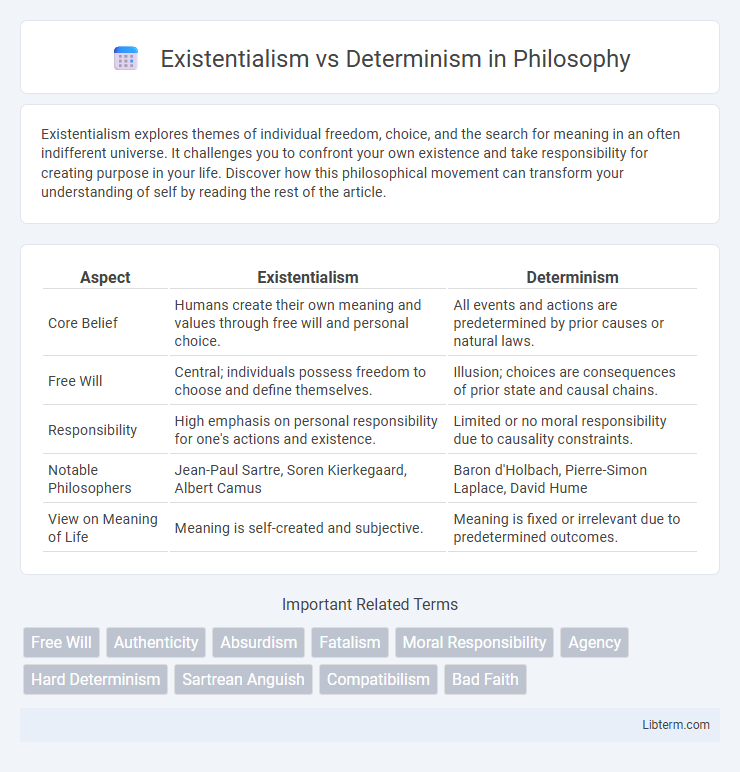Existentialism explores themes of individual freedom, choice, and the search for meaning in an often indifferent universe. It challenges you to confront your own existence and take responsibility for creating purpose in your life. Discover how this philosophical movement can transform your understanding of self by reading the rest of the article.
Table of Comparison
| Aspect | Existentialism | Determinism |
|---|---|---|
| Core Belief | Humans create their own meaning and values through free will and personal choice. | All events and actions are predetermined by prior causes or natural laws. |
| Free Will | Central; individuals possess freedom to choose and define themselves. | Illusion; choices are consequences of prior state and causal chains. |
| Responsibility | High emphasis on personal responsibility for one's actions and existence. | Limited or no moral responsibility due to causality constraints. |
| Notable Philosophers | Jean-Paul Sartre, Soren Kierkegaard, Albert Camus | Baron d'Holbach, Pierre-Simon Laplace, David Hume |
| View on Meaning of Life | Meaning is self-created and subjective. | Meaning is fixed or irrelevant due to predetermined outcomes. |
Introduction to Existentialism and Determinism
Existentialism emphasizes individual freedom, choice, and subjective experience as the foundation of human existence, asserting that people create their own meaning in an otherwise indifferent universe. Determinism, in contrast, posits that every event or state is causally determined by preceding events, implying that free will is an illusion constrained by natural laws or fate. Understanding these concepts involves exploring how existentialism champions autonomy and personal responsibility while determinism highlights the influence of external forces shaping human behavior.
Core Principles of Existentialism
Existentialism centers on individual freedom, choice, and responsibility, emphasizing that humans create their own meaning in an inherently meaningless world. This philosophy rejects deterministic views by asserting that existence precedes essence, meaning people are not bound by predetermined nature or fate. Core principles include authenticity, angst, and the necessity of making meaningful choices despite uncertainty.
Key Tenets of Determinism
Determinism asserts that all events, including human actions, are determined by prior causes and natural laws, emphasizing causality and inevitability. Key tenets include causal determinism, which holds that every effect has a preceding cause, and logical determinism, the belief that future events are fixed and knowable. This framework challenges the existentialist emphasis on free will by proposing that choices are predetermined within an unbroken chain of events.
Historical Background and Influential Thinkers
Existentialism emerged in the 19th and 20th centuries, with key figures like Soren Kierkegaard, Friedrich Nietzsche, Jean-Paul Sartre, and Simone de Beauvoir emphasizing individual freedom, choice, and subjective experience. Determinism, rooted in classical philosophy and science, finds proponents in thinkers such as Baruch Spinoza, Pierre-Simon Laplace, and more recently, neuroscientists exploring brain activity's influence on behavior. The historical divide highlights existentialism's focus on human agency contrasting with determinism's assertion of causality and inevitability in human actions.
Freedom and Responsibility: Existentialist Perspective
Existentialism emphasizes individual freedom and the inherent responsibility that comes with making authentic choices in an otherwise indifferent universe. It asserts that humans are condemned to be free, meaning they must create their own meaning and values without relying on predetermined essences or external authorities. This radical freedom entails accepting the burden of responsibility for one's actions, highlighting a core tension between self-determination and the anxiety of existential choice.
Causality and Fate: Deterministic Outlook
Determinism emphasizes causality, asserting every event is the inevitable result of preceding causes within a fixed chain of time and space, leaving no room for randomness or free will. Fate, in this deterministic outlook, is viewed as the consequence of prior conditions and natural laws governing the universe, implying that human choices are predetermined rather than autonomous. Existentialism challenges this by emphasizing individual freedom and responsibility despite causal constraints, arguing that meaning is self-created in a seemingly indifferent or predetermined world.
Personal Agency: Clash between Existentialism and Determinism
Existentialism emphasizes personal agency, asserting that individuals create meaning through free will and conscious choices despite an absurd or indifferent universe. Determinism challenges this by arguing that all actions and decisions are predetermined by prior causes, limiting true freedom and individual control. This clash highlights a fundamental debate about whether humans possess authentic autonomy or are constrained by preexisting conditions.
Modern Debates: Free Will versus Predestination
Modern debates on existentialism versus determinism center on the conflict between free will and predestination, questioning whether human choices are autonomous or predetermined by external forces. Existentialist thinkers like Jean-Paul Sartre argue for radical freedom, asserting that individuals create their own essence through actions, while determinists emphasize causal chains and laws of nature that constrain human agency. Contemporary discussions integrate neuroscience and philosophy, exploring how brain activity and environmental factors influence decision-making without entirely eliminating the possibility of moral responsibility.
Real-life Implications and Ethical Considerations
Existentialism emphasizes individual freedom, choice, and responsibility, which influences ethical decisions by encouraging authentic living and personal accountability despite an inherently meaningless universe. Determinism asserts that all events, including human actions, are pre-determined by causal chains, challenging notions of free will and moral responsibility in legal and social systems. Real-life implications include debates over punishment, where existentialism supports retribution based on conscious choices, while determinism advocates for rehabilitation grounded in understanding underlying causes.
Conclusion: Reconciling Existentialism and Determinism
Reconciling existentialism and determinism involves recognizing that human freedom exists within certain causal constraints, allowing for meaningful choice despite predetermined conditions. Existentialist emphasis on individual agency complements deterministic frameworks by highlighting subjective interpretation and responsibility in shaping one's path. Integrating these perspectives fosters a nuanced understanding of human existence, balancing fate with free will.
Existentialism Infographic

 libterm.com
libterm.com